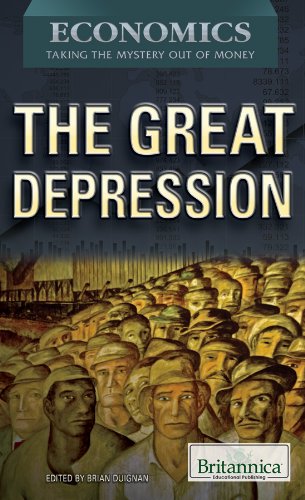-
The Great Depression
R. G. Grant
Library Binding (Lucent Books, Oct. 3, 2005)Discusses the causes, events, and aftermath of the Great Depression. Q
Q
-
The Story of the Great Depression
R. Conrad Stein
Paperback (Childrens Pr, Dec. 1, 1985)Discusses the causes, conditions, and events of the Great Depression V
V
-
The Great Depression 1929-1938
Tim McNeese, Richard Jensen
Library Binding (Chelsea House Pub, April 1, 2010)For many Americans, the era of the "Roaring Twenties" represented good times, a respite from war, and a booming economy. Consumer goods flew from the shelves of America's stores and shops, and the country invested in the stock market as never before. But by the end of the decade, millions witnessed the end of those heady days of jobs, money to spend, and financial security. Fear gripped the nation. By the end of the 1930s, the United States had experienced at least 10 years of hard times, unemployment, and radical change that redefined the role of the federal government. The country had relied on its new president, Franklin D. Roosevelt, to boost the economy with his ambitious New Deal programs, but many questioned the success of his policies. Readers can explore for themselves the effectiveness of Roosevelt's policies and the legacies they left in this timely volume.
-
The Great Depression
Robin Johnson
Library Binding (Crabtree Pub Co, Jan. 30, 2014)This engaging title begins with a recount of the events of October 29, 1929, better known as Black Thursday, to mark the dawn of the Great Depression era. Readers will discover the causes of the depression, its affect on people across North America, and how governments responded to it. Readers will also draw comparisons to modern-day economic trials. T
T
-
The Great Depression
Brian Duignan
Library Binding (Britannica Educational Pub, Dec. 15, 2012)Discusses the Great Depression, including the economic history surrounding it and the political, artistic, cultural, and social responses to the economic disaster.
-
The Story of the Great Depression
Mona K Gedney
Library Binding (Mitchell Lane Publishers, May 15, 2005)The Great Depression was one of the worst crises of the twentieth century. For some time, the very survival of the country appeared to be at stake. Businesses failed, banks closed, people lost their homes, and thousands lined up at soup kitchens across the United States. Franklin D. Roosevelt proposed "a new deal," and in 1932 he was elected president. Many of his New Deal policies shaped the country in ways that are still visible today, like Social Security and the 40-hour work week. The government struggled to help the people and to keep the economy stable.The Great Depression could not be legislated out of existence, however. Only a world war was able to vanquish it. X
X
-
The Great Depression
Don Nardo
Hardcover (Lucent, Dec. 14, 2007)Discusses the possible causes of the Great Depression, the social conditions in which people--including minorities and women--lived during the Depression, the government's actions during this time, and its legacy. X
X
-
Great Depression of 1990
Raveendra N. Batra
Paperback (Bantam USA, Nov. 15, 1988)None
-
The Great Depression
Alon Bersharder, Holly H Karloff
Paperback (Independently published, May 11, 2017)Character study of a depressed, socially awkward simpleton who plods through life, obsessed with landing full-time work and a girl. In between failed job interviews, he finds hope chatting with an enamored teen who lives halfway across the country, but his STD gives reason to call off their meeting. After concluding he's destined to be a temporary employee and die alone, he begins to wonder if life itself might be a waste of time.
-
The Great Depression
Stewart Ross
Hardcover (Evans Publishing Group, Sept. 26, 1997)None
-
The Great Depression
Nathaniel Harris
Hardcover (B T Batsford Ltd, Aug. 1, 1988)None
-
The Great Depression
Peggy J. Parks
Library Binding (KidHaven Press, Aug. 18, 2003)The Great Depression was one of the bleakest times in United States history. After the prosperity that followed World War I, the stock market crash of 1929 forced many people into poverty. This book examines the causes of the Great Depression, the devastating effects of it, the 1930s drought in the Midwest called the "Dust Bowl" era, and the country's eventual recovery after the onset of World War II. T
T